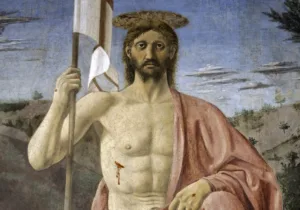In addition to Christ’s entry into Jerusalem this Passion Week, there’s reason to believe that at least one other significant procession—that of Pontius Pilate—took place at nearly the same time. Some suggest that Jesus planned his own arrival to correspond directly with Pilate’s.
As prefect of the Roman province of Judea, Pilate, who normally resided in Caesarea, would likely have seen it necessary to be in Jerusalem over the Passover—a celebration with not just deep religious significance for the Jews, but one often accompanied by nationalistic zeal as well. Pilate would be on hand to personally oversee the keeping of civic order. Thousands upon thousands would converge upon Jerusalem during the Passover festival. Beyond the typical petty brawls and squabbles over religious differences or merely overcrowding that might erupt anytime so many of the zealous are crushed together, Pilate would have been cognizant of more dire threats. Commemorating the Hebrew’s liberation from slavery in Egypt and God’s smiting of the enemies of His people on the eve before the exodus, it would be reasonable that Pilate would worry the gathered mass of celebrants might work themselves into a frenzy and imagine themselves again a free and independent people, waiting only for their God to work another wonder and wipe the Romans into the sea. Pilate knew that if a spark were handy, a fire might be lit.
Jesus, meanwhile, had rather bigger fish to fry.
Comparing these two processions results in interesting juxtapositions. One worth making here is of the two very different kinds of authority processing into the dusty capital. Both bore the basic attributes of authority, which includes legitimacy, responsibility, and the power to exercise that responsibility.
Whatever the similarities, of course, Jesus was a very different kind of authority than any of his earthly counterparts. Too often, however, acknowledging this difference centers attention on the issue of divine power and proceeds from there to misconstrue how Jesus wielded that power and what it might mean for us. We see the gross injustice of Christ’s execution, seize upon his going to that death as a substitutionary sacrifice on our behalf, and thereby claim from it a personal mandate to go and do likewise. In doing so, we very often get ahead of ourselves. Wrong facts beget bad ethics.
While it’s true that Christ “humbled himself by becoming obedient even to the point of death, even to death on a cross” it would be wrong to claim that this kind of self-sacrifice in the face of injustice is now incumbent on followers of Christ, tout court.
But some do make this claim. Some time back, Zahnd, the popular pastor and writer, provided an example of this when he draws the wrong lessons from his, rather breathless, proclamation, “Jesus not only died on a cross, he called his disciples to take up their cross and follow him!” While the excited punctuation makes me nervous, you can’t disagree with the basic point. Jesus after all used those very words. Disagreement does come when Zahnd ventures to pronounce what all this must mean. He writes, “We take up our cross because in following Jesus we are prepared to choose suffering over security.” Though this willingness to choose suffering over safety is true as a contingency, Zahnd intends it to be the Christian preference: “How can you be a Christian when there is no risk? How can you take up your cross and follow Jesus if there’s no danger of suffering? Removing all risk makes Christianity incomprehensible.”
This is absurd. Christians acting Christianly in the context of this world will, almost without doubt, suffer for it. But neither suffering nor the risk of suffering is the esse of Christianity—neither describes it’s essential nature. Christian suffering, however much it can be expected, is an accident of Christian history, not it’s purpose. To say otherwise is to make a hash of our image of paradise and hamstrings any sense of urgency in the here-and-now to alleviate the plight of the poor, the orphan, or the widow. Per Zahnd, their suffering, after all, is simply makes their Christianity comprehensible.
Stanley Hauerwas, happily Zahndian, brings our attention back to the two processions. Reflecting on the events of Passion Week, Hauerwas writes: “We (that is, we Christians) have now been incorporated into Christ’s sacrifice for the world so that the world no longer needs to make sacrifices for tribe or state, or even humanity.” He continues:
Constituted by the body and blood of Christ we participate in God’s Kingdom so that the world may know that we, the church of Jesus Christ, are the end of sacrifice. If Christians leave the Eucharistic table ready to kill one another, we not only eat and drink judgment on ourselves, but we rob the world of the witness necessary for the world to know there is an alternative to the sacrifices of war.
Hauerwas concludes from this that “the sacrifices of war are no longer necessary. We are now free to live free of the necessity of violence and killing. War and the sacrifices of war have come to an end. War has been abolished.” How can this be? For “the church is the alternative to the sacrifice of war in a war-weary world. The church is the end of war.”
Bless Stan’s heart, but the world hasn’t gotten the memo. But that is the point. The only way that Hauerwas can live in his alternative Kingdom is because the Earthly Kingdom of Pontius Pilate remains. Predominately military in nature, Pilate’s primary tasks would have involved using his forces to maintain order, justice, and peace. The Pax Romana—the peace of Rome—was not perfect, not by a longshot. But Rome did a better job at keeping neighbor from eating neighbor—which is always good news for the poor—than any of the alternatives then on offer.
The belief that the power of Christian witness will end human conflict is something that history, a rudimentary understanding of human nature, and lived experience will not affirm. This is what makes Christian pacifism anathema. The Christian pacifist often assumes the classic Anabaptist position that while the government’s use of force to punish the wicked is ordained by God, that is not the role of the Christian faithful who are, instead, to provide a peaceable alternative. But this distinction, as Nigel Biggar has often affirmed, is incoherent. If God Himself believed that Hauerwas’ peaceable kingdom was currently practicable as an alternative to the more coercive kingdoms of this world, then presumably He—being a good God—would have ordained that peaceful alternative kingdom over the coercive kingdom. A good God would not, after all, ordain unnecessary coercion. As it is, were it not for this coercive kingdom, Hauerwas’ kingdom would be overrun by the beasts. But, I suppose, at least this would make Christianity comprehensible.
Snark aside, this latter point is the worse one. The implication of the fact that God has indeed ordained the coercive kingdom is that the just expenditure of force is actually necessary to prevent hells on earth and that, therefore, the peaceable kingdom of Hauerwas’ inebriated imagination cannot be a true alternative; it can only be parasitic. As Biggar puts it, pacifist believers are forced into “contradicting in principle what they depend upon in practice.” Christian pacifists are able to keep their own hands clean only because others—who, in the Christian pacifist view must be non-Christians—are willing to get their hands dirty. Ultimately, such a view is a crime against charity. Zahnd asserts that the constant rival to the kingdom of Christ is empire and that “the supreme obsession of empire is security.” Empires, he tells us, “always justify their violence in the name of security.” That may be. But for Zahnd to decry the Christian support for the sovereign’s sword as a concession to empire is unjust. The Christian justification for the necessary, proportionate, and discriminate use of retributive violence—just force really—has never been simply security. It has always only been love.
The Palm Sunday processions into Jerusalem, then, best signal not the entry of the peaceable kingdom over and against the coercive kingdom but, rather, of the Heavenly Kingdom and the Earthly Kingdom. In aspiration, these two kingdoms largely match Augustine’s “two cities.” Each was created by different kinds of love—the earthly city by self-love reaching the point of contempt for God, the Heavenly City by the love of God carried as far as contempt for self. Christians, however, presently live in both cities. Our dual citizenship is a calling.
Each of these kingdoms have discreet concerns and, therefore, discreet mandates to meet those concerns. This doesn’t mean the concerns never overlap. But a great deal of harm comes from confusing the purposes—the ends—of one kingdom with the other. The incarnation, crucifixion, and resurrection of Jesus Christ had particular concerns: the immortality of the soul, divine judgement, salvation and damnation, moral formation and sanctification, and so forth. This week we confess that one of Christ’s purposes was to reconcile humanity with God. From the stealing of the fruit forward, humanity has displaced God with idol after idol. We grasp at that which is not ours—or not yet ours. The crisis for those yearning for the heavenly kingdom was how to bridge the chasm we have dug between ourselves and the Divine. Christ bridged that gap. He satisfied the Divine Character when we could not. If the cross was not substitutionary, then it was merely circus.
This reconciliation with God means nearly everything to us. But not, quite, everything. The cross saved me from my sin, but it didn’t do much to protect my neighbor from it. Saved from Sin is not saved from sinning; and, meanwhile, I—and my neighbor—continue to pay the everyday costs of that.
And so, as one temporary remedy, God gave us the sword of the government. One need only read the litany of rape, unleashed cruelty, wanton slaughter, and sexual enslavement that make up the 18th-21st chapters of Judges—a period in which Israel had no king—to realize the great grace that is Romans 13.
The start of Passion Week marks the beginning of the end of Christ’s great plan to make us fit for eternity. Meanwhile, between the end of that first Passion Week and the beginning of the end of time, there is much living to be done. But because the condition of the human soul make this living precarious, the conditions to make it possible must sometimes be compelled.
God mandated, not suggested, that human magistrates do just that—and to do that justly. That is something else to be passionate about.







 Sponsor a student for Christianity & National Security 2024
Sponsor a student for Christianity & National Security 2024